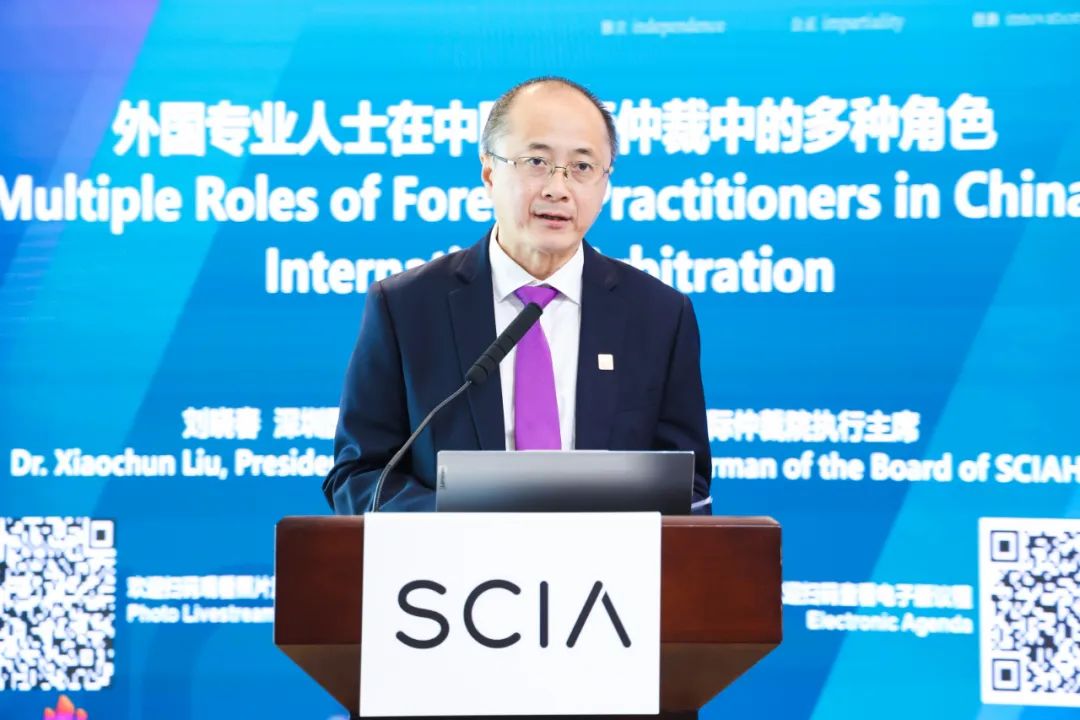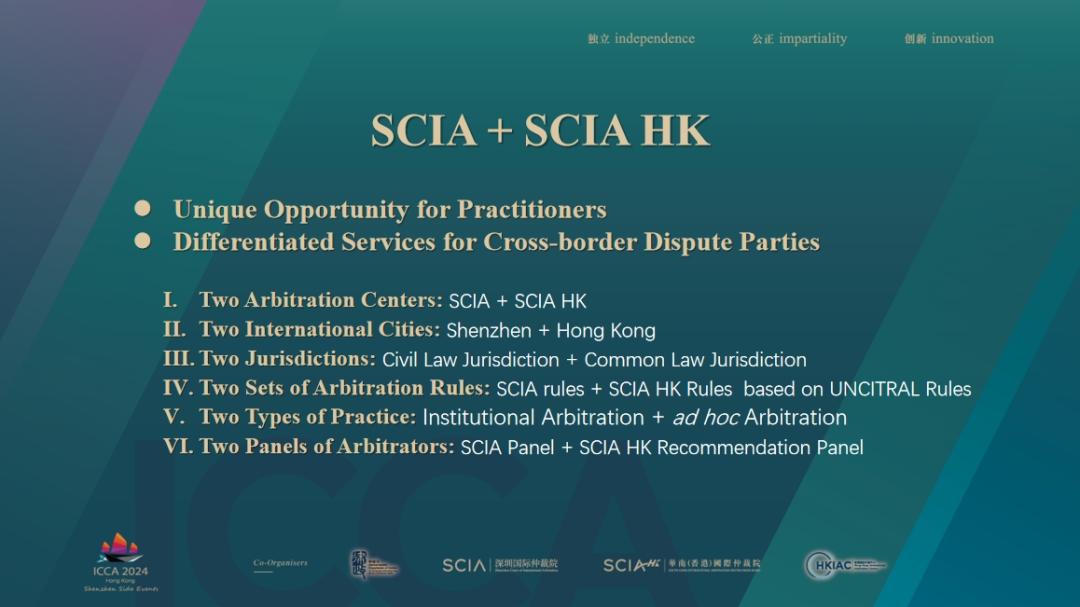
刘晓春:外国专业人士在中国国际仲裁中的多重角色
发布时间:2024-06-05 00:17:59
2024年5月9日,由深圳国际仲裁院(SCIA)和华南(香港)国际仲裁院(SCIA HK)携手香港特别行政区政府律政司、香港国际仲裁中心(HKIAC)举办的第二十六届国际商事仲裁理事会(ICCA Congress)深圳边会(下称“深圳边会”)在深圳前海国际仲裁大厦(SCIA Tower)举行。深圳国际仲裁院院长、华南(香港)国际仲裁院执行主席刘晓春以“外国专业人士在中国国际仲裁中的多重角色(Multiple Roles of International Practitioners in China's Arbitration)”为主题发表演讲。现将其主题演讲摘录如下。

Distinguished guests, ladies and gentlemen, good morning!
Welcome to Shenzhen, the first special economic zone in China.
This week, we have witnessed the successful ICCA 2024 Congress held in Hong Kong, with the SCIA and the SCIA HK standing as the Diamond Sponsors of the event. Today, together with the Department of Justice of Hong Kong SAR and the HKIAC, the SCIA and the SCIA HK jointly host the ICCA 2024 Shenzhen Side Event here in the SCIA Tower.
Before I share with you the Multiple Roles of International Practitioners in China's Arbitration from the Perspective of SCIA, I would like to give you a brief introduction about the history of the SCIA.
The SCIA was established in 1983, at the very beginning of China's Reform and Opening-up. It is a pioneer of China's international arbitration. In 1984, the SCIA became the first arbitration institution in China to include overseas arbitrators on its panel. In 1989, it became the first arbitration institution in China, whose arbitral award was enforced overseas according to New York Convention. In 2012, it became the first arbitration institution in the world to established a corporate governance structure under a unique statutory-body legislation. In 2019, the SCIA HK was established by the SCIA, giving due regards to Hong Kong SAR's common law system and having its arbitration rules based on UNCITRAL arbitration rules. Last year, the arbitration caseload of the SCIA increased to 12,004 cases, with a total amount in dispute reaching RMB 138.31 billion. So far, the arbitration and mediation services of SCIA have been extended to 140 countries and regions.
According to the Ordinance on the SCIA (the Ordinance) and the SCIA Arbitration Rules, there are at least six important roles that international practitioners can play in China's international arbitration, and they are: decision maker for the body, arbitrator, mediator, expert witness, counsel, and tribunal secretary.
The first role is Decision Maker.
According to Article 8 of the Ordinance, the Council is the decision-making body for the SCIA; according to Article 9 of the Ordinance, at least one-third of the Council Members shall be from jurisdictions outside Chinese mainland. Currently, 9 out of 15 Council Members are from overseas jurisdictions, including Roberto Azevêdo, former Director-General of WTO; Sir William Blair, former Commercial Court Judge in England and Wales; Prof. Peter Malanczuk, former Dean of City University of Hong Kong School of Law; and Anthony NEOH, SC, former Chairman of the Hong Kong Securities and Future Commission, and so on.
Roberto Azevêdo, SCIA Council Member, Former Director-General of WTO
Concerning the SCIA HK, the board of directors is the decision maker for the body. Six Council Members of the SCIA are also sitting on the Board of Directors of SCIA HK. Anthony NEOH is also one of the speakers of this conference.
I believe, these renowned international practitioners from the legal, financial and business sectors help the SCIA and the SCIA HK enhance its independence, impartiality and international reputation.
This is the first role of international practitioners in China's arbitration.
The second role is Arbitrator.
In 1984, the SCIA took the lead to be the first arbitration institution in China to enlist arbitrators from overseas on its panel. Notably, 8 of the 15 arbitrators forming its first panel were from overseas jurisdictions.
Currently, the SCIA Panel of Arbitrators enlists a total of 1,541 arbitrators from 114 countries and regions all over the world. Among them, 569 arbitrators are from jurisdictions outside Chinese mainland, counting 36.92% of the total.
In March this year, in San Francisco, the SCIA Council issued certificates to the SCIA panel arbitrators based in North America.
The SCIA continues to welcome outstanding international practitioners to join its panel of arbitrators to further enhance the internationalization and professionalization of China's arbitration.
This is the second role.
The third role is Mediator.
Recently, there were about 20% of arbitration cases were concluded by mediation within arbitral procedures. However, some foreign parties concern the possible bias because of double-hatting of arbitrator and mediator.
The SCIA has been developing at least 6 kinds of Harmonious Dispute Resolution (HDR), by combining separate mediation and separate arbitration. The SCIA HDR mechanism includes SCIA Mediation Center mediation plus SCIA arbitration, Industrial mediation plus SCIA arbitration, Canton Fair mediation plus SCIA arbitration, Overseas mediation plus SCIA arbitration, “Mediation + Arbitration + Self Discipline + Administrative Regulation” four-in-one Capital market dispute resolution, Joint Mediation by the Greater Bay Area Mediation Alliance.
Through the above 6 kinds of HDR mechanisms, many international practitioners have had plenty of opportunities to participate in SCIA's mediation. For example, as the only arbitration and mediation institution at Canton Fair, the biggest trade fair in China and even in Asia, the SCIA has been providing on-site mediation service since 2007, to resolve international trade and intellectual property disputes. By 2023, the SCIA's mediation services at Canton Fair had reached 120 countries and regions around the world.
This is the third role of intentional practitioners in the SCIA.
The fourth role is Expert Witness.
The SCIA Arbitration Rules allow international practitioners to participate in its arbitration process by acting as expert witnesses.
According to Article 42 of SCIA Arbitration Rules, “as to the law and other professional issues, the parties may engage an expert witness on such relevant issues to provide written submissions and/or testify in the oral hearings”; according to Article 45 of SCIA Arbitration Rules, “where the arbitral tribunal considers it necessary, or where a party so requests and the arbitral tribunal agrees, the arbitral tribunal may appoint experts for, inter alia, appraisal, audit, evaluation, testing or consultancy to produce expert report”.
In Practice, according to the SCIA Rules, many arbitral parties have agreed to apply foreign laws, consequently, international practitioners have plenty of opportunities to participate in arbitration of the SCIA as expert witnesses.
The fifth role is Counsel.
According to Article 24 of the SCIA Arbitration Rules regarding representatives, “[a] party may be represented by its authorised representative(s) including but not limited to the counsel from the Chinese Mainland or from jurisdictions outside the Chinese Mainland, in handling matters relating to the arbitration.”
As more and more international parties are choosing the SCIA for arbitration, more and more international lawyers are becoming involved in China's arbitration through their role as counsels for the parties.
Here is the case concluded with the largest amount in dispute in China, managed by the SCIA, with an amount in dispute of RMB 13.4 billion. There were 3 parties from China and the U.S., and representatives were from 5 jurisdictions. Before the dispute aroused, the contract did not have an arbitration clause. After investigations on the SCIA and based on the confidence in the independence and impartiality, 3 parties entered into an arbitration agreement and chose SCIA to settle the dispute, by the way of Med-Arb. In the end, the dispute was settled within 13 days.
This is the fifth role, counsel, as shown in this video interview.
The counsel for the US party in the case
The sixth role is Tribunal Secretary.
In recent years, the international caseload has been exploding in the SCIA, with the disputing amount increasing from RMB 3.9 billion in 2012 to RMB 138.3 billion in 2023. Currently, the SCIA arbitration and mediation parties have covered 140 countries and regions.
Under this increasing international caseload, it is necessary for us to establish a panel of tribunal secretaries that is open to the domestic and international practitioners. Last year, the SCIA and the SCIA HK jointly initiated the cross-border tribunal secretary programme, establishing the "SCIA+SCIA HK" Panel of tribunal secretary, training candidates to administer arbitration cases under two different jurisdictions (Civil Law and Common Law) and two sets of rules (the SCIA and the SCIAHK rules), based in Hong Kong SAR and Shenzhen.
Therefore, tribunal secretary is the sixth role of international practitioners in the SCIA and the SCIA HK, which provides new opportunities for young generations to practice in Shenzhen and Hong Kong SAR.
To conclude my presentation in Chinese(最后,我想以中文总结我今天的演讲):

以SCIA的改革创新为视角,国际专业人士至少可以在中国国际仲裁中发挥理事、仲裁员、调解专家、专家证人、代理人、仲裁庭秘书这六种角色的重要作用,这是中国制度型开放的生动写照。
深圳和香港通过协同创新,创造了“双城、两院、双法域、双规则、双轨实践和双名册”的差异化互补性“六双”独特优势,共同建设面向世界的亚洲国际仲裁首选地,也为共同提升粤港澳大湾区市场化法治化国际化营商环境发挥着“双引擎”功能。




